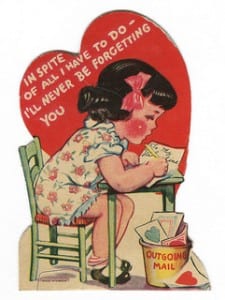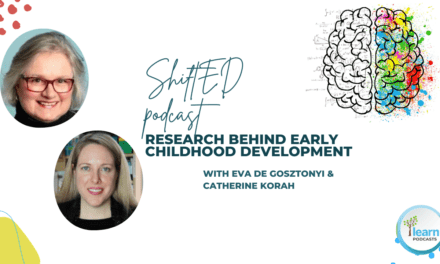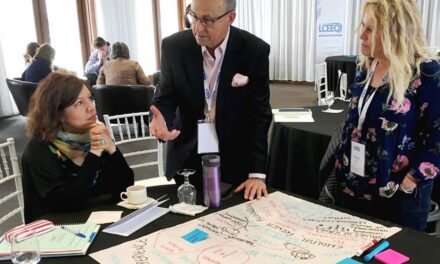I have spent the past twenty years of my life entrenched in the Elementary school system here in Quebec. My roles and responsibilities may have shifted and evolved over the course of time but my underlying focus and driving impetus have remained constant; to discover ways to engage and expand children’s understanding and love for literacy. My dedication and passion for literacy began at the start of my teaching career in developing critical literacy lessons for my own classroom in the English Montreal School Board inner city and has deepened through my work with pre-service teachers at McGill University in the Department of Integrated Studies in Education as I encourage them to consider how their choice of resources and pedagogical approaches will have a distinct effect on their ability to create a community of readers and writers in their future classrooms. My time spent traveling across the province as a consultant for English Language Arts Elementary Education at the Ministère de l’Éducation du Loisir et du Sport with our team’s fundamental intent on assisting in the understanding and implementation of the Language Arts competencies of the Q.E.P to now working for LEARN in generating and supporting dynamic and enriching literacy experiences for students and teachers of all ages has allowed me to remain an active participant in the field of education and literacy.
All my life I have loved school. As a child, I remember with fondness the excitement of a backpack filled with school supplies, a new dress for the first day, the smell of autumn leaves, the sound of the entry bell and best of all the anticipation of all that would be accomplished that year. As an adult working in the field, I remember that feeling of excitement once again when the Q.E.P. was introduced with an English Language Arts curriculum dedicated to the study of literacy. I have prided myself in trying to be a true role model of lifelong learning for my students. I have always done my utmost to better my teaching abilities and my own professional knowledge.
As I strive to advance my understandings and perceptions on how literacy might be best taught in today’s elementary classrooms, I am once again filled with those same feelings of excitement and anticipation as I find myself a few nights a week in the classrooms of McGill’s education building…not as teacher but as a student. It is because of the children and teachers with whom I have had the good fortune to meet and speak with throughout my educational career that I know I am ready to continue on to the next steps of my own academic journey of discovery.
Our world is changing and evolving at an extraordinary rate. We now live in an increasingly diverse, globalized, and complex, media-saturated society. In order for our students to be prepared to navigate this 21st century world, they must become literate in 21st century new literacies that include, but is not limited to, critical, multicultural, digital, and media literacies. If we are to encourage them to be passionate literacy learners then we need to meet them where they are at and engage them in a way that they too will discover a love of literacy that will last a lifetime.
Literacy instruction has traditionally referred to the teaching of basic literacy skills—reading, writing, listening, and speaking. However, in today’s digital world, technology has contributed to an expanded understanding of literacy. Besides having basic literacy skills, 21st century students also need technology skills for communicating, analyzing, accessing information, thinking critically about messages inherent in the media, understanding data, and developing strong opinions. If students do not sufficiently learn these new literacy skills, there is a distinct possibility they will be unable to properly process information they are presented within the very near future.
What sends the blood pumping through my heart at this moment is the possibility of looking at literacy from a different perspective; of re-inventing the way I have been used to seeing literacy in action. I want to explore deeply and sincerely the actual impact of incorporating the new literacies into an elementary English Language Arts literacy curriculum. This venture will contribute to a more holistic understanding of teaching multiliteracies within Quebec’s elementary classrooms. It will provide a greater depth and breadth of understanding of how the new literacies can be implemented in unison with the traditional literacies, look at the contribution that these pedagogies and practices can have on teachers and students alike, and draw conclusions that will be important to the English Language Arts educational community province wide, and beyond.
What has inspired me to want to really gaze intensely at the new literacies was actually the following piece of traditional poetry.
Valentine for Ernest Mann
by Naomi Shihab Nye
You can’t order a poem like you order a taco.
Walk up to the counter, say, “I’ll take two”
and expect it to be handed back to you
on a shiny plate.
Still, I like your spirit.
Anyone who says, “Here’s my address,
write me a poem,” deserves something in reply.
So I’ll tell you a secret instead:
poems hide. In the bottoms of our shoes,
they are sleeping. They are the shadows
drifting across our ceilings the moment
before we wake up. What we have to do
is live in a way that lets us find them.
Once I knew a man who gave his wife
two skunks for a valentine.
He couldn’t understand why she was crying.
“I thought they had such beautiful eyes.”
And he was serious. He was a serious man
who lived in a serious way. Nothing was ugly
just because the world said so. He really
liked those skunks. So, he re-invented them
as valentines and they became beautiful.
At least, to him. And the poems that had been hiding
in the eyes of skunks for centuries
crawled out and curled up at his feet.
Maybe if we re-invent whatever our lives give us
we find poems. Check your garage, the odd sock
in your drawer, the person you almost like, but not quite.
And let me know.
This is my Valentine to you all in hopes that you will find love and passion in everything you do by simply looking at what is around just a little bit differently. After all, that is the life force of a poet…to take the ordinary and make it extraordinary. Poets do indeed see with the heart; maybe we can too.





